|
|
Chapter Three: CBS Records (1976)
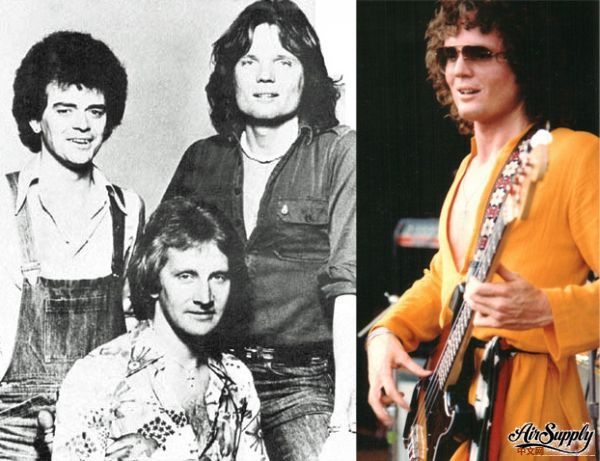
Jeremy Paul (Right)
Jesus Christ Superstar continued its successful run into 1976 with performances in Adelaide, Melbourne, Perth and Sydney. Joining Superstar in February for the Brisbane leg of the tour was Jeremy Paul, the brother-in-law to Superstar producer Harry M. Miller. Jeremy had just finished a tour with the stage play Joseph and the Amazing Technicolor Dream Coat, and was previously the bass player in a band called Soffrok. Soffrok, who’s name was almost always spelled incorrectly, had a Top 40 single in Australia with ‘Set Me Free.’ Jeremy had a brief run as a solo artist in 1972 when he released his one and only single ‘What Becomes Of You My Love.’ He went to Europe for two years as a solo artist doing sessions and clubs. “My mother plays piano and so does my sister,” said Jeremy, “and the idea was for me to play piano too. But I went through what I think a lot of kids can identify with their parents wanting them to do something, and the obvious thing is to play the piano. But unfortunately the majority of old ladies who teach kids to play usually lose the kid’s interest very quickly, and that’s what happened to me. The next bribe was a guitar to develop the boy in other areas besides scholastic and sporting.”
Russell and Graham invited Jeremy to join them, where they juggled Superstar with their own live shows, which usually took place after 10:30PM, when Superstar wrapped up. “We got the concept for the band when Jeremy joined us, said Graham. “I had this idea for the band; I knew what I wanted it to be like, and I think Russell did too - we were thinking along the same lines. Then Jeremy joined and he played bass. I remember we were sitting in the theatre one day watching somebody rehearse, and I said, ‘Do you play a musical instrument?’ and he said, ‘Yeah, I play bass.’ I said, ‘Yeah, I thought you did.’ And it all went from there. The music was vastly different when Chrissie was in the group, before Jeremy joined - as we had just acoustic guitar, congas and three vocals. But now with Jeremy’s voice there’s more bottom in it, because Jeremy’s a baritone, same as me. Jeremy usually sings the low lines which give it more bottom and more depth. You can tell he’s been trained when he sings solo things because he’s definitely got more control than me and perhaps more than Russell has sometimes.”
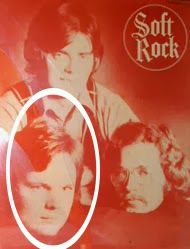
Jeremy Paul with Soffrok
Russell’s unique and powerful voice was admired by many in the Superstar cast, including Jon English. Jon was working on his third solo album and he had Russell sing backup vocals on two songs: ‘Laughing At The Guru’ and ‘If You Think You’re Groovy.’ Russell was also credited for playing percussion. Jon released his album, ‘Hollywood Seven,’ in May 1976, and its first single (‘Hollywood Seven’) was a big radio hit in Australia and New Zealand.
Russell and Chrissie Hammond sang harmony vocals on a song called ‘Take My Hand,’ from Australian country singer Anne Kirkpatrick’s second album: ‘Let The Songs Keep Flowing Strong & Naturally.’ Kirkpatrick, the daughter of legendary Australian country singers Slim Dusty and Joy McKean, released her album in 1976 to rave reviews. After just one year in Superstar, Russell now had experience in the recording business as a session musician.
By the summer of 1976, Graham, Russell and Jeremy were considered an exceptional live band and were already thinking about careers in music after Superstar. They recorded three of Graham’s compositions onto a tiny cassette player during Superstar’s tour in Melbourne; ‘Love and Other Bruises,’ ‘Empty Pages’ and ‘If You Knew Me.’ Superstar music director Frank Esler-Smith suggested several important adjustments to ‘Love and Other Bruises,’ a song that Graham wrote several years earlier and had performed live with Chrissie Hammond. Hammond and Graham knew the song had huge potential because it always got a great response at pubs and coffee houses. When Russell first heard it he was blown away.
“We decided to make a demo one afternoon in the pit of the orchestra,” recalls Graham. “We hired the keyboard player and musical director (Frank Esler-Smith), and the drummer (Danny Groves) to play in the pit, and we made this demo on a one track cassette recorder, straight down. The hired musicians hadn’t heard the songs before, we just wrote out rough charts for them. When we played it back we were amazed because all of the harmonies were there and everything was happening. We took it around to all the record companies and they all laughed at us.” But Graham’s persistence paid off when he took the demo to Peter Dawkins at CBS in Sydney. Dawkins and Graham were already friends from when they met a few years earlier, but Graham was not aware that Dawkins had become the resident producer for CBS. Much to Dawkins delight, Air Supply essentially fell into his lap. “CBS had just begun their operations in Australia at that time, so they were looking for new things,” said Graham. “Peter Dawkins fell in love with it and thought it would be a hit song.”
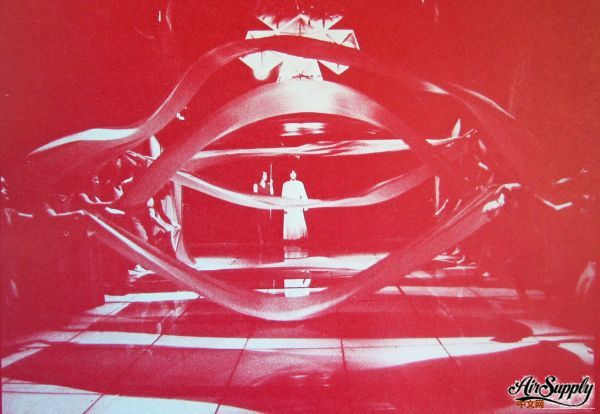
Holding Canopy Over Jesus (Superstar)
Peter Dawkins was well known in the Australian recording industry, mostly through his work in the early 70s with the band Ariel, and as producer with Festival Records. He moved to CBS in 1975, where he was promised a production royalty for as long as he was with the company, plus various other incentives, just to get him on board. CBS was desperate to create a domestic local roster, and they told Dawkins to ‘spend whatever you like’ to make it happen. He quickly signed Ariel, and later inked a deal with New Zealand/Australian rock band Dragon, who he lured away from Polygram after hearing them perform at the Recovery Wine Bar.
“Air Supply came to me,” said Peter Dawkins. “I’d seen them originally when they came up from Melbourne, and they consisted of Chrissie Hammond and Graham Russell. I think that Russell Hitchcock was with them, but I’m not sure about that. But anyway, I knew basically what they were all about. Then three guys came into my office, Jeremy Paul, Russell Hitchcock and Graham Russell as a trio, and I was sort of familiar with their work. They appeared in my office before I had auditioned them live, and I found myself falling in love with their music. It was a tape they had made and it showed off their vocal prowess and composing ability. The tape had three songs on it. Two I believed were hits if recorded properly; ‘Love and Other Bruises’ and ‘Empty Pages.’ So I offered them a contract on the spot. I literally pulled it out of the drawer and said take this away and get your lawyer to have a look at it or whatever you’ve got to do. Because they were an experienced part of the cast of Jesus Christ Superstar, I had quite a different approach to them. Instead of insisting I see them live, I accepted that they could perform; went about putting them with prospective management and asked the trio if they could get another couple of players.”
Following their first meeting with Peter Dawkins, Air Supply recorded additional independent demo tapes in Sydney, and considered offers from two other record companies. They signed with CBS in July to record a single, but not an entire album. It was common for record companies to introduce a new artist by releasing a single. If this did well, a second single might follow, then an LP that contained both singles and several other new songs. Russell remembers the morning they first signed the contract because it led to a poor performance in Superstar that afternoon. “The day we got signed by CBS we were working in Superstar, and we went out for lunch with Peter Dawkins to celebrate. We had a few drinks and could barely scratch ourselves. At the start of the show, Graham and I, plus two other guys had to lift up these huge poles and hold this canopy over Jesus when he walked down. We almost took Jesus out! We got in a lot of trouble for that, but fortunately, they let us stay.”

Studio 2 Bruce Brown (Left)
With the new contract in hand, the band joined producer Peter Dawkins and engineer Bruce Brown at Albert Recording Studio in Sydney. It was one of the major recording studios in Australia, having gained a reputation as a real rock and roll studio because bands like AC/DC, Rose Tattoo, The Angels and John Paul Young recorded there. One of the walls in Albert Studio 1 was covered in graffiti created by many famous musicians. Air Supply recorded in Studio 2, which was built in 1976 to help alleviate the demand for Studio 1. The control room in Studio 2 was designed with wood paneling on the front wall and half of the side walls to make it acoustically live in the front and dead in the back. Included in Air Supply’s recording session was drummer Graeme Pearce and pianist Peter Deacon, both session musicians. Everyone in the studio was immediately blown away when Russell sang the vocals for ‘Love and Other Bruises,’ especially when he took it up an octave during the songs climax. “We all just looked at each other,” said Graham. “When we heard it back I knew it was one of those songs that would be around for a long time. I knew when I wrote it that it was going to be a big song, although I sat on it for ages and ages, over three years.”
The trio recorded two songs in just four hours, and CBS hoped to release ‘Love and Other Bruises’ as the debut single as soon as possible. The quick turnaround might have surprised the band, because Dawkins had a reputation as a producer who demanded perfection. “Being in the studio, I was as fastidious and as much of a pain in the arse as you can imagine,” said Dawkins. “I demanded a lot, I expected a lot, and I got as much as I could, because I knew the moment you walked out of there, it was finished with.”
The band did not have a name at this point, and was told that they would need a come up with something by the next morning so that the single could be released. Russell remembers asking his co-workers for advice. “We asked the cast members [in Superstar] to make some suggestions and they didn’t take us seriously at all. I got really angry because of some of the names they thought we should use.” The next morning, Graham suggested a band name. “We knew the next day we needed a name,” said Graham, “so we said whoever comes up with the best name, we would go with that. [That night] I had a dream which featured a big billboard with flashing lights in multiple colors, and the center said Air Supply. We never knew what it meant. Years later we learned that air means melody, but we had no idea at the time.”
‘Love and Other Bruises’ had potential to be a strong commercial single, but its success was by no means a sure thing. Despite a 20% local content quota, it was very difficult for new bands to get played on Australian radio during prime time. Australian records were often programmed late at night with American and U.K. singles dominating prime time. Unless you were Sherbet, Marcia Hines or Skyhooks, radio was hesitant to add a new Australian single into heavy rotation. Johnny O’Keefe, one of Australia’s most accomplished rock performers, believed that local content quota should have been increased to 33-1/3% - the rate of a long playing record. The head of the Australian Musicians’ Union believed that radio stations would rather play a hit tune 20 times, instead of 20 different records. “They have a habit of selecting what’s already popular, rather than doing anything that plugs a new record,” he said.
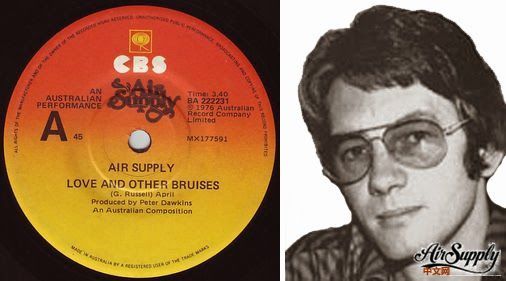
CBS Australian Pressing Peter Dawkins
‘Love and Other Bruises’ was released, under the name of Air Supply, in late September of 1976. It immediately earned radio play from 5KA in Adelaide, who was the first radio station to recognize and acknowledge Air Supply. 5KA disc jockey Dave Barnett recognized ‘Love and Other Bruises’ as a classy Australian single. “They write their own songs, and there is no other Australian band like them,” said Barnett. “They’re really smooth and professional. They have really nice production on the single.”
2GB in Sydney was the only other radio station playing the single, but it came when the station was experiencing tumultuous staff problems and the single got lost in the resignations and dismissals of disc jockeys and programmers. It was not until mid November, when Air Supply came to Adelaide to play for a week, that Graham received a phone call saying that the Eastern states had picked up ‘Love and Other Bruises.’ 2SM in Sydney and 3XY in Melbourne made up for lost time and enthusiastically got behind the single. By late November, ‘Love and Other Bruises’ was in heavy rotation throughout most of Australia, and by Christmas it was in the Top 10 all over the country.
Music fans welcomed the melodic song from Air Supply, which was much different than anything else on the radio. RAM magazine described it as “having three well-baited hooks. A very good pop song. Russell Hitchcock’s unusually clear, emotional lead vocal makes it stick.” Denis Handlin, Australian Recording Industry Association Chairman, felt that ‘Love and Other Bruises’ was a song that had Peter Dawkins written all over it. “Just a class above everything else for production technique,” said Handlin. “Peter knew how to get the best out of the artists, how to bring out the real creative brilliance. I first got close to Peter when he worked with Air Supply. I had just moved to Sydney in 1976. Peter had a real interest in the follow through of marketing, promotions and sales. Some people in the Australian music scene would say, ‘Well, it was a hit when it left my office,’ but Peter would never let go. He would spend all that time in the studio, and he would be with that record all the way through until it had sold all the records it possibly could. He wouldn’t sign-off on something in the studio until he got near perfection. That could be the rawness in a song that was just down-and-dirty rock and roll, or a beautiful Air Supply ballad.”
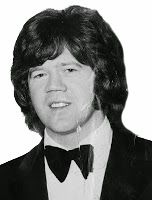
Doug Henderson
‘Love and Other Bruises’ reached #6 on the Kent Music Report in January of 1977, and charted for 28 weeks. It was #64 on the National Top 100 Singles Chart for 1977. As expected by CBS, the single sold very well. They quickly signed Air Supply to record an album, which also placed the band under the direction of CBS Australia for five years. On the recommendation of Peter Dawkins, Air Supply hired Doug Henderson as their band manager. Born in Timaru, New Zealand, Henderson was the guitar player in a band called The Falcons in the 60s, which for a very short period included Peter Dawkins on drums. In 1970, Henderson moved to Sydney and got into artist management.
While Graham, Russell and Jeremy were performing in Superstar, they were not allowed to promote themselves as Air Supply because the Superstar contract stipulated that most cast members could promote only the show. When ‘Love and Other Bruises’ debuted on 5KA radio, the public had no idea who Air Supply was. During the final weeks of Superstar in October, Air Supply performed at coffee houses and small clubs, and when they played ‘Love and Other Bruises,’ the audience was amazed at the acoustic version, and how well Russell Hitchcock could imitate Air Supply’s mysterious singer. “Suddenly there was this band that no one knew anything about called Air Supply,” said Graham. “‘Love and Other Bruises’ was at the top of the charts, but no one knew anything about us! We had never done an interview or anything. We were just very lucky to get our single on the radio, and it just took off. It was just the right time, but it was very different because it was a big ballad.”
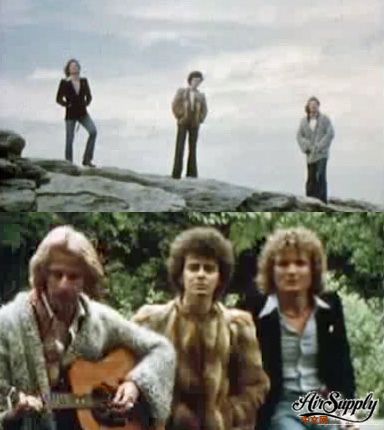
‘Love And Other Bruises’ Video
Rumours persisted that Air Supply was a band from the West Coast of America. Trevor White, who played Jesus in Superstar and had toured Australia and New Zealand with English rock group Sounds Incorporated, knew exactly what Air Supply was going through. Trevor had a Top 40 hit while he was a member of the cast, but felt it could have been much bigger had he been able to promote himself. “You need to get out and be seen for all the other things you can do,” he said. “For the past few years, everyone has seen me in the role of Christ, because I’ve played into the character of the role. But it’s better to be known for something than for nothing.”
Air Supply returned to Albert Studio to sing backup vocals for a song called ‘This Time’ from Dragon, which was released as their second CBS single in September 1976. Their first Australian single (‘Wait Until Tomorrow’) had flopped, and CBS gave them one last chance to produce a hit. ‘This Time’ peaked at #26 on the Australian charts in November, and was included on Dragon’s 1977 gold certified album ‘Sunshine.’ “We sang on Dragon’s first record because they weren’t really sure about harmonies or anything,” said Graham. “So they asked us to come play on their record. Russell and I sang all the backup vocals on ‘This Time,’ and we hoped that they would return the favour someday.”
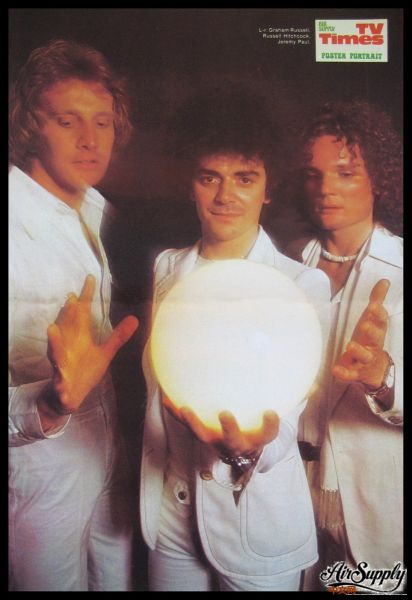
On October 16, Jesus Christ Superstar held its final show in Sydney, ending a successful run that had lasted over 18 months. Contractually, Air Supply was now free to promote themselves. “Superstar was a great lesson, in that we did the same show every single night,” said Russell. “We couldn’t change the order of the songs. Being directed and told where to be, at what time, gave us professionalism, and we got confidence from playing to big crowds. Graham and I were born out of the same test tube at the start of the show. We both got in there and crouched down in these loin cloth things that we wore. The house lights went down to signal the start of the show and we would both say how much we didn’t want to do this at all. But once the overture started, it was like somebody turned on the power for us. Every single night, for 600 shows, we were never bored, never disinterested, and always gave it one hundred percent.”
“Superstar exemplified my own sense of achievement in theatre,” said legendary Australian promoter and producer Harry M. Miller in 1983. “The production cradled so much young talent and creative ingenuity that I would be proud to be judged by it alone as my contribution to theatre in Australia. Of the many recollected joys I am perhaps fondest of the way in which the show acted as a catalyst on the careers of many of its contributors. I think particularly of Jon English who played the part of Judas magnificently throughout Superstars’s four-year run and went on to carve a career of prodigious success as an actor, singer and concert entertainer. Superstar also was the cradle for the group which has become internationally acclaimed as Air Supply. Graham Russell and Russell Hitchcock, two young tyro musicians, had been in the cast for a year or so as Apostles and principal understudies. Jeremy Paul, [my wife] Wendy’s younger brother, joined the cast on his merits early in 1976 and quickly discovered that the three of them had common musical ambitions. He helped translate ambition into achievement. Soon after Superstar closed in October 1976, Air Supply was up and away. Jeremy is no longer with the group but my vicarious pride in its success is no less keen.”
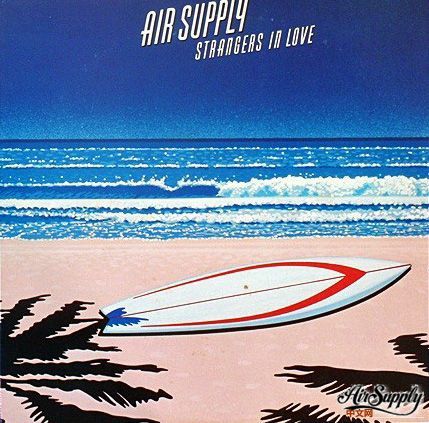
'Strangers In Love' - Japan CBS/Epic
Air Supply found themselves back in the studio on Monday, October 18, just two days after Superstar closed. Peter Dawkins and the band worked feverishly for five straight days at EMI Studios (used by INXS and AC/DC) in Sydney, and finished the album before the following weekend. The sound on the album was mostly similar in style to ‘Love and Other Bruises.’ It had an organic and raw quality, the result of using very few technical effects in the studio. Graham and Jeremy used no effects on their guitars, although Graham hoped to experiment with guitar phaser foot-pedals on future albums. Russell used no effects on his voice. Most of his vocals were recorded with just a single track, something that was quite rare at the time. Double tracking was the norm with most lead singers because it gave the vocal a fuller, more appealing sound, especially for singers with a weak voice. Russell’s single tracking was an indication of the strength and quality of his voice.
The new studio and touring band included drummer Jeff Browne, guitarist Mark McEntee and keyboardist and arranger Adrian Scott. The entire band promoted themselves as peachy clean, with none of the rough edges like other rocks bands in Australia. “We always wanted to keep the band on a level that was different to anything else in Australia,” said Russell. “We wanted to have a classy image, to look good. And we wanted the product to sound good. You can’t describe the music, people will just have to hear it. It’s sort of new music, not aggressive rock, and very melodic.”
During the final weeks of Superstar, Trevor White, Jon English and Air Supply inked a deal to tour Australia together in November and December, in a show called Superstar in Revue. It was a opportunity to piggyback on the success of Superstar. They performed in Queensland and some of New South Wales, but due to the increasing demands on Air Supply, and a few management problems Jon English was having, the show had to be cancelled. The shortened tour gave Air Supply significant exposure and their popularity climbed quickly, but the band was still closely associated with the Superstar brand. They needed to create their own identity. “I always think of Superstar as Jon and Trevor,” said Graham. “Maybe Mary Magdalene but not as much as Jon and Trevor; they’ll never get rid of it, not for a long time. It’s an honour and an incredible recommendation coming from a show like that, because it was such an experience doing it. We couldn’t have wished for more really. None of us will be upset with the association with Superstar, but I daresay as none of us played major roles it will disappear completely within a couple of months.”
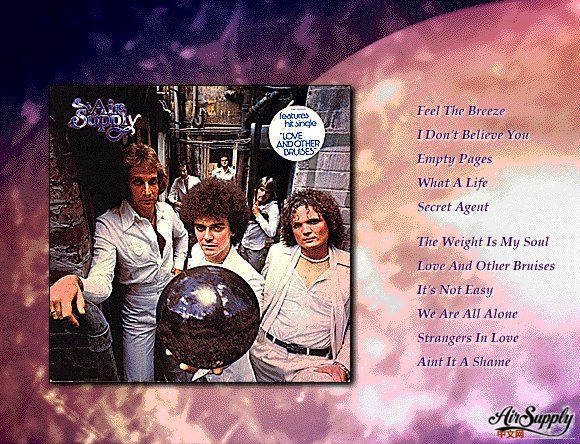
In December 1976, just two weeks after final production, the self-titled album (CBS SBP 234929) was released. It was originally set to debut in February, but Air Supply’s phenomenal speed of success forced CBS to release it 14 weeks early. It sold very well in Australia, and reached a high of #17 on the National Album Chart in January of 1977. The album’s cover photo and design was described as one of the finest to come out of Australia that year. “We went into the alley simply to make people aware of where we came from, because we all came from the streets,” said Graham. “The crystal ball signifies the music which is all white and pure, not aggressive at all. That’s where we get all our inspiration from, and we’re looking to the crystal ball to find a way out.” Rainbow Music Group, under licence from CBS Australia, reissued the album in 1977 (RSVLP 002). CBS/Epic reissued the album in 1980 in Japan, where it was titled ‘Strangers In Love’ (25-3P-232) and featured different cover art.
Reviews of the album in Australia were extremely positive:
Right from the opening bars, this album shapes up as one of the best soft rock albums to arrive from an Australian performer this year. Tight, professional, intelligently produced by Peter Dawkins, Air Supply might not play heavy charismatic rock but they construct and deliver their soft rock flawlessly. ‘Love and Other Bruises’ is the feature cut of the LP, naturally, and the same lead voice handles about half the others. But the overall variety of the lead vocals, when the other two members of the trio that make up Air Supply tackle songs as well, provides for enough color to keep the disc fresh over the length of two sides. This album will have no trouble succeeding in the pop and maybe even MOR markets, and to all you hard-rock freaks out there I give you this ancient saying: good soft rock is infinitely better than bad hard rock. - Al Webb, Juke
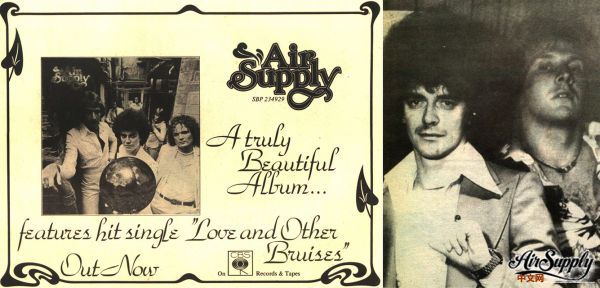
The more you listen to this record, the more you appreciate the 3-D production and finesse of the sound. Contrary to popular (and record company) opinion, I don’t think Graham Russell’s songs (on the musical side) are spectacularly different from others in the same field (some, like ‘Secret Agent,’ do stand out above the others on the album), but it’s what they do with them that counts, which includes production, subtle arrangements (unschmaltzy) and beautifully controlled singing. [The lyrics] lack the individual eccentricity to make them great, but eccentricity isn’t what Air Supply are about, and Russell’s lyrics are solid in their own right, mainly about love and other bruising day-to-day emotions. - Juke
The real stars of Jesus Christ Superstar may turn out to be three fellows by the names of Graham, Russell and Jeremy, all members of the show’s second touring company. Combining under the name of Air Supply they’ve turned out as good a debut album it’s been our pleasure to hear - fine arrangements and production, decisive harmonies, discreet but appropriate backing, it’s got the lot. The eloquent ‘Love And Other Bruises’ has been getting its fair share of air play; it’s a delicious ballad that can take its place among similar songs anywhere. But so could the discoish ‘Feel The Breeze’ and ‘We Are All Alone’ and the harmonically excellent ‘It’s Not Easy’ and ‘The Weight Is My Soul.’ Air Supply’s great strength apart from Russell’s prolific writing - he wrote every song on the album - is its vocal strength - nurtured no doubt by its many nights of JC Superstar proximity - and its fine musical backing. - Paul Speelman & Mike Daly, The Age
Air Supply are three young guys who met while performing in the last Sydney production of Jesus Christ Superstar. When that show folded they decided to get together and form a group and launch themselves into the pop market. It was obviously the right move because, as this debut album proves, they have a big future. Within weeks of the album’s release the track ‘Love and Other Bruises’ was climbing up the Top 40 charts all over the country. - David Ramsey, The Australian Woman’s Weekly
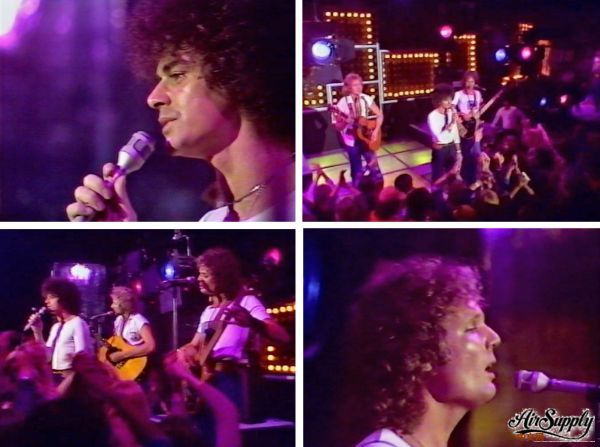
Countdown Performance - December 5, 1976
On December 5, Air Supply performed ‘Love and Other Bruises’ on the Australian TV music show Countdown. The show had had Air Supply on its radar since April, at which point the band was barely established. Countdown was the most popular music television show in Australia and it had a strong influence on radio programmers. It could, with just one play and an endorsement, shoot a single into the charts. It was no coincidence that ‘Love and Other Bruises’ raced into the Top 10 after Air Supply appeared on Countdown.
“You didn’t have to rely on radio solely,” said record label executive Michael Gudinksi. “You could do a Countdown show and next week, if your song was good, you would see the sales. You would get into everyone’s lounge room. It was really a part of life to sit down on Sunday night, and whether you liked the bands or you didn’t, it was just a talking point of the week.”
Countdown was broadcast nationwide on Australia’s government-owned ABC (Australian Broadcasting Corporation), and it featured a high content of Australian acts. An Australian content rule insisted that 20% of music aired on radio have some form of Australian involvement, and Countdown often exceeded this requirement. National television had similar content rules. Countdown’s popularity faded in the late 70s, but Air Supply’s appearance in 1976 gave the band a visual presence in Australia. It gave them an identity other than ‘the guys from Superstar.’
EMI’s national promotions manager, Rob Walker, stressed the importance of television for Australian acts: “In promotional terms, the Australian record market is unique because of the strong influence exerted by television. Apart from the weekly rock shows, we have over 70 other television programs that recognize the importance of contemporary music and have formats flexible enough to allow the regular inclusion of film clips, interviews and live performances.” It is claimed that the Australian music industry had the highest level of television exposure of any country in the world.
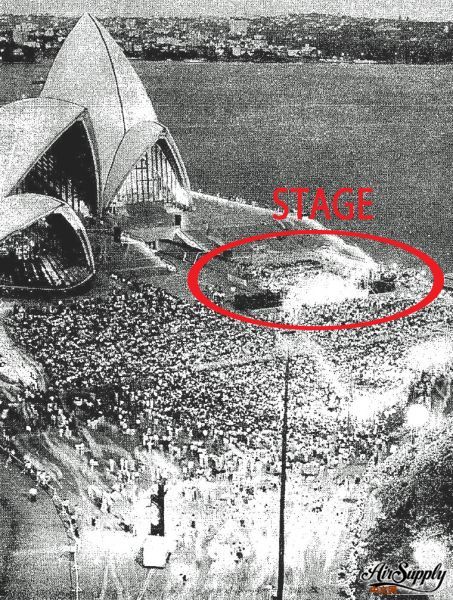
Festival of Sydney - Dec 31, 1976
On December 26, Air Supply played the Sydney Flemington Market. Organizers of the Flemington concert, the first to be held at the market, predicted that the building would become a regular venue for performances by top rock groups. Hundreds of teenagers attended the day-long session of rock music at the market, which included twelve groups.
Air Supply was now in demand all over Australia. They were invited to perform at a New Years Eve celebration outside the Sydney Opera House. The free outdoor concert was just the start of a month-long series of events to celebrate the Festival of Sydney. Performing on the main stage was Renee Geyer, John Paul Young and the Allstars, Air Supply and the full Australian Opera and the Elizabethan Sydney Orchestra. To accommodate the event, a specially constructed transparent sound-shell was built on the southern staircase of the Opera House, along with a lighting tower and two follow spot towers. The sides of the stage were stacked with an endless supply of JBL speakers. The show got underway at 8 p.m. when master of ceremonies Harry M. Miller introduced the evenings first band; Air Supply. But just before they took the stage, four fire trucks, with sirens sounding, drove through an emergency lane to the Opera House to a suspected fire in the kitchen. After the dust settled, Air Supply performed songs from their debut album for a crowd of 90,000, who sat on rugs, garden furniture, inflatable mattresses and their overcoats on the asphalt. “I drove to Brisbane in 1972 because a friend of mine was getting married,” said Russell. “I was living in Sydney at the time, and I actually stopped at the Opera House the day before it was opening. To be able to play there on the steps on New Years Eve was a big thrill for us.” |
|